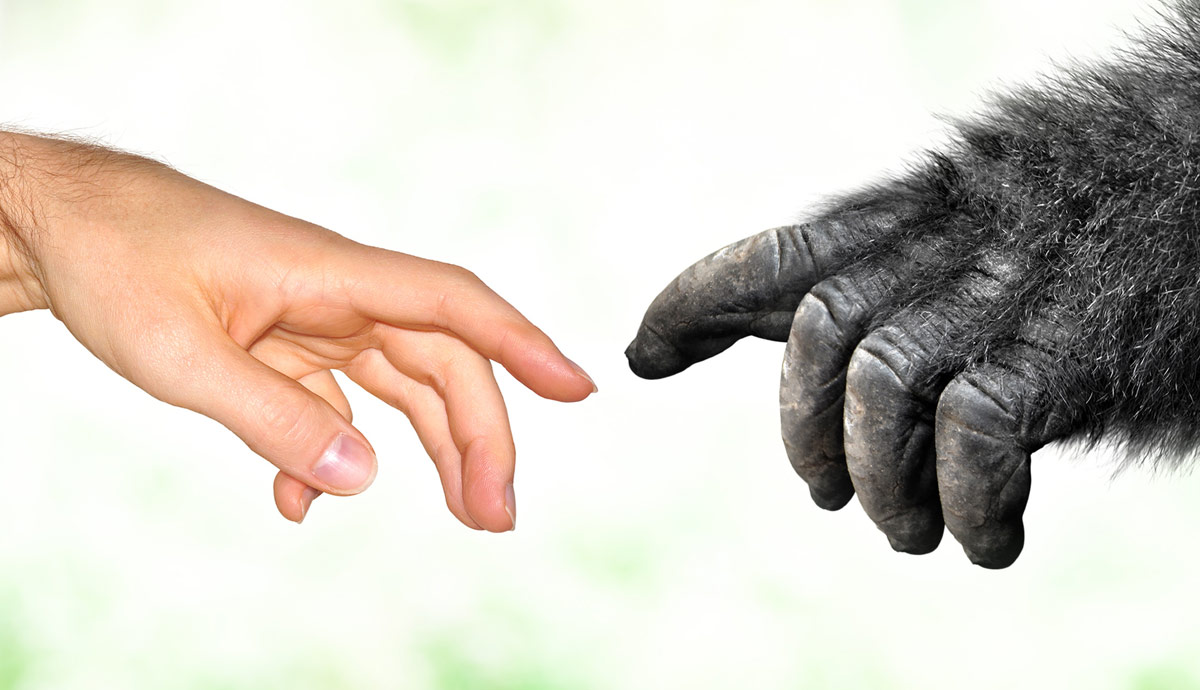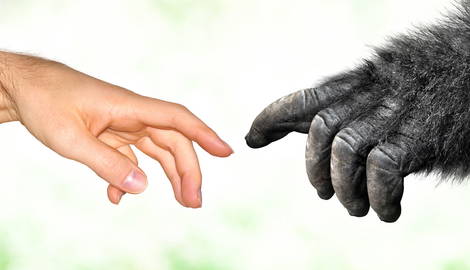
The Great Apes are humanity’s closest relatives. They look like us, walk like us, raise children like us, and can use tools like us. But do they think like us too? A major difference between apes (e.g., gorillas, orangutans and chimpanzees) and humans is the use of language. Since apes cannot use words to communicate, is it possible to determine whether or not apes think about concepts such as the afterlife?
Monkey See, Monkey Do

Monkey see, monkey do, right? Humans have evolved to be at the top of the food chain. This isn’t because we have the largest brains in the animal kingdom (whales, dolphins, and elephants have the biggest brains). Nor are we the biggest creatures (think bears, giraffes, colossal squids, etc.). What separates us is our brain function and our brain-to-body size ratio.
However, humanity’s closest animal relatives, the great apes, have striking similarities with humans and human brain function, despite their furry appearance. One of the most human-like characteristics that apes display is their use of tools. Chimpanzees use rocks to open hard shells and twigs to grab delicious insects from hard-to-reach spaces. Orangutans have even been witnessed using sticks to go spear-fishing for their food.
Use of Tools, Use of Language

Even though we have approximately 98% of our genetic makeup in common with the four species of great apes (Bonobos, Chimpanzees, Gorillas, and Orangutans), there still exists quite a bit of difference between the 2% of genes we don’t have in common. The most notable difference is probably the use of language. If you’ve ever interacted with someone whose native language differs from yours, then you know how hard communication about the world can be.
It’s no different with apes. Of course, they can still communicate, but the method by which they do so lacks language, a characteristic that is only a human attribute. That said, the late Koko the gorilla, who resided at Gorilla Foundation’s Preserve in Woodside, California, knew hundreds of English words for sign language. She couldn’t vocalize these words into complete sentences, but she could give the sign for “cat.” She once had a pet cat that she adored, and it passed away. Koko was very sad after this and communicated through sign language that she was sad.
Subjectivity vs. Objectivity

This begs the question: do animals feel sadness? When scientists perform their observations, they do so objectively. They care about raw data, not what a subject might be feeling inside. Scientists like to avoid anthropomorphizing. Anthropomorphizing is when we assign human attributes to the subject we are studying. For instance, if a dog is shedding a tear, scientists would say that the dog appears to be crying. They wouldn’t say that this dog is feeling sad because we cannot know what the dog truly feels. This is a subjective experience that scientists aren’t concerned with; they are concerned with objective data. Philosophers, on the other hand, ask questions about the subjective experience.
Philosophy of mind deals with questions about consciousness. What is consciousness? Why do we have consciousness? What are the necessary conditions for consciousness? One great paper that is often referenced is titled “What Is It Like to Be a Bat?” by the American philosopher Thomas Nagel. This essay aims to get the reader to try and experience what the subjective experience of being a bat is like.
What if we ask this same question about our primate cousins? This is a bit more straightforward, or is it? We certainly use tools in a more sophisticated manner, and we do climb trees, albeit not as well or with as much grace as the apes. We also vocalize like apes do to communicate, but we are certainly more distinguished.
The Mirror Test

It’s easy to imagine being an ape, right? Not so fast. Well, what about things like love? Do apes feel love? Are apes capable of perceiving beauty? Even if apes possess emotions, are they aware of their emotions? These are questions that not only exist when thinking about apes’ subjective experience but can extend to humans as well. Can we be certain the person next to us experiences their emotions in the same manner as us, assuming they have normal functioning brain faculties? An individual with a traumatic brain injury in the speech centers of their brain might have issues communicating through speech, but this is an outlying example.
Because apes are not as far advanced on the evolutionary tree as we humans claim to be, they make for a good frame of reference to study the philosophy of mind and what makes the human mind distinguishable from other creatures. In the previous paragraph, I asked the question that if apes had emotion, were they self-aware of the emotions they were experiencing?
There is a study that is given to apes and children called the Mirror Test to test if, at a given time, the individual is self-aware. This test consists of the subject, whether ape or child, having a mark, maybe paint, put on their face, and then a mirror is presented in front of them. If the subject has a well-developed sense of self, they typically see the mark and try to rub it off. Kids don’t display this sense of awareness until after a few years of age, and only the smartest apes seem to pass the test.
Human Brain, Ape Brain

Given the fact that being self-aware is a product of the prefrontal cortex in our brain (the part at the very front, right behind the forehead) and apes do possess a prefrontal cortex, we might assume that, yes, they are aware of their emotions. However, this might not be the case. Remember that we currently cannot know this. Just as I cannot be certain of your exact subjective feeling while reading these words, I can only estimate with some degree of certainty that if you’ve made it this far, you find these words interesting and feel curious about how brains perceive the world. I hope this is true, but regardless, even if I cannot know your subjective feelings while reading this, there are observations one could make to indicate a level of interest in the subject. For instance, if you aren’t drifting off into sleep, I can assume you aren’t tired or bored and might be relatively engaged in this article.
These kinds of observations work well for scientists, but philosophers, especially philosophers of the mind, are tasked with asking other questions. Back to our subjects, the apes. Despite their lack of language, they are extremely humanlike in appearance and perhaps in thought as well.
Apes and Conceptual Thinking

Since apes are so similar to us in physiology, could their thoughts also be similar? Do apes have concepts of beauty? With no language, how would they express their experience of beauty? Can they feel love? In recent years, neuroscientists have shown us that when individuals feel and express when they are “in love,” they see consistent levels of a combination of oxytocin (the love hormone), dopamine, and serotonin, among other neurotransmitters.
Although this indicates a quantifiable and somewhat reliable indication of feeling love, what about things that aren’t quantifiable, such as justice, goodness, and the afterlife? Interestingly, apes have been observed to be altruistic. Furthermore, apes have even been shown to mourn the losses of individuals within their troops. An amazing image from National Geographic (featured below) shows a troop of chimps observing their fallen comrade as his body is being prepared for its final resting place.
Chimpanzees Mourning Troop Member

The photograph above shows how similar our primate cousins are in certain aspects to human beings, i.e., they grieve their dead. It also begs another question: do apes ponder an afterlife? Based on the photo, this troop of chimps is reflecting on their fallen member. Are the chimps pondering if he has a soul? Do they think that he will exist in a different form after death? Do the chimps ponder their own death if they are self-aware? If they are indeed considering these questions, how can a soul be represented without language?
These questions are popular within philosophical circles but are also essential for the rest of humanity. Asking these questions brings us closer to a fundamental essence of what it means to be human and an overall theory of mind that is still widely debated in philosophical circles. Comparing our minds to our great ape cousins gives us insights into ape and human minds. It also paves the way for us to understand where we came from and where we (and apes!), as a species, might be headed in future generations.
What do you think? Do apes ponder the afterlife? Are they aware of conceptual topics like beauty? Does their altruism indicate that they have a sense of moral goodness? Perhaps you’ll find the answer.








